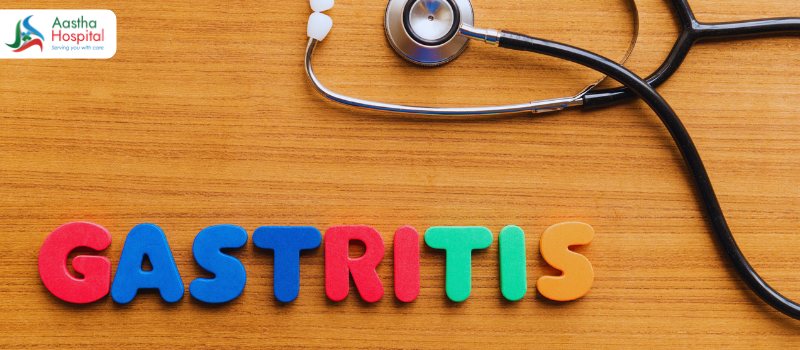Gastritis is a condition where the lining of your stomach becomes inflamed. It can be sudden (acute) or long-lasting (chronic). Common causes include infections, stress, and certain medications. While medication can help, a proper diet is also important to manage gastritis. At Aastha Hospitals, we guide you on what to eat and avoid to help you feel better and heal faster.
Understanding Gastritis
Gastritis is an inflammation of the stomach lining. It comes in two main types:
- Acute Gastritis: Happens suddenly and can be caused by things like alcohol, certain medications, or infections.
- Chronic Gastritis: Develops over time and can be related to long-term irritants or conditions like autoimmune disorders.
Common Symptoms:
- Stomach pain or discomfort
- Nausea and vomiting
- Loss of appetite
- Bloating and gas
- Indigestion
Common Triggers:
- Spicy foods
- Too much alcohol
- Smoking
- Long-term use of certain painkillers (NSAIDs)

The Role of Diet in Managing Gastritis
Your diet plays a big role in controlling gastritis symptoms. Eating the right foods can help reduce stomach inflammation and promote healing.
Foods to Eat (Do's of a Gastritis Diet)
High-Fiber Foods:
- Examples: Oatmeal, brown rice, whole wheat bread, beans, apples, and berries.
- Why: Fiber improves digestion and reduces stomach irritation.
Lean Proteins:
- Examples: Skinless chicken, turkey, fish like salmon, lean beef.
- Why: Lean proteins are easy on the stomach and help in healing.
Non-Acidic Fruits:
- Examples: Bananas, melons, peeled apples.
- Why: These fruits are gentle on the stomach and provide essential vitamins.
Low-Fat Dairy or Dairy Alternatives:
- Examples: Low-fat yogurt, skim milk, almond or soy milk.
- Why: These are easier to digest and less likely to cause symptoms.
Cooked Vegetables:
- Examples: Carrots, spinach, zucchini.
- Why: Cooking vegetables makes them easier to digest and less irritating.

Foods to Avoid (Don’ts of a Gastritis Diet)
Spicy and Acidic Foods:
- Examples: Hot peppers, citrus fruits, tomatoes.
- Why: These can irritate your stomach and worsen symptoms.
Fried and Fatty Foods:
- Examples: Fried chicken, French fries, bacon.
- Why: They can slow digestion and increase irritation.
Caffeinated and Carbonated Drinks:
- Examples: Coffee, soda, energy drinks.
- Why: These can stimulate acid production and make symptoms worse.
Alcohol and Tobacco:
- Examples: Beer, wine, cigarettes.
- Why: Both can irritate your stomach lining and slow down healing.
Processed and Packaged Foods:
- Examples: Hot dogs, deli meats, instant noodles.
- Why: These often contain additives that can irritate the stomach
Tips for Managing Gastritis Through Diet
- Eat Smaller, Frequent Meals: Instead of three large meals, try eating smaller meals more frequently throughout the day to avoid overloading the stomach.
- Stay Hydrated: Drink plenty of water and avoid sugary or caffeinated beverages. Hydration supports overall digestive health.
- Chew Food Thoroughly: Take your time to chew food thoroughly, which aids in digestion and reduces the workload on your stomach.
- Keep a Food Diary: Tracking what you eat and how it affects your symptoms can help identify personal triggers and adjust your diet accordingly.

Consulting with Healthcare Professionals
Always talk to your doctor or a dietitian for advice tailored to your specific needs. They can give you personalized recommendations for managing gastritis.
Managing gastritis involves more than just medication. By eating the right foods and avoiding irritants, you can reduce symptoms and improve your overall health. At Aastha Hospitals, we’re here to help you with personalized care and advice. Visit us to learn more about managing gastritis and start your journey to a healthier life.


